Lets see how fast Germany can break once it loses its initiative. I wonder if a landing in France is already possible or wether a campaign in Italy would be better
The Eagle and the Pentagon - U.S.AAR
- Thread starter Gormytorysh
- Start date
-
We have updated our Community Code of Conduct. Please read through the new rules for the forum that are an integral part of Paradox Interactive’s User Agreement.
You are using an out of date browser. It may not display this or other websites correctly.
You should upgrade or use an alternative browser.
You should upgrade or use an alternative browser.
PTW - I tried to play the USA once...Japan never declared war against me and the USSR took over all of Europe. 
PTW - I tried to play the USA once...Japan never declared war against me and the USSR took over all of Europe.
Ha! Same thing happened to me in my first US game. Japan happily minded its own business while I conquered Italy. Almost liberated France but the Soviets reached Paris days before me. The Red Army was so huge I just gave up on the game - no way to liberate Europe from that behemoth.
Lets see how fast Germany can break once it loses its initiative. I wonder if a landing in France is already possible or wether a campaign in Italy would be better
I am thinking of landing in the Netherlands, take Rotterdam asap to secure a big harbor for supplies and spread from there into the Motherland
PTW - I tried to play the USA once...Japan never declared war against me and the USSR took over all of Europe.
Have you issued an embargo on Japan? They did not attack me until I did issue one, I think that might just be the last drop for them.
Ha! Same thing happened to me in my first US game. Japan happily minded its own business while I conquered Italy. Almost liberated France but the Soviets reached Paris days before me. The Red Army was so huge I just gave up on the game - no way to liberate Europe from that behemoth.
Though I would not like the sight of a big red blob, I would not mind taking on that fight
Very good AAR! Subbed!
Thank you and welcome!
Not in that game - I was trying to keep them out of the Axis (and did) but they also refused to join the Allies. It was kind of funny watching a independent Japan while Europe was in flames.Have you issued an embargo on Japan? They did not attack me until I did issue one, I think that might just be the last drop for them.
Difficult strategic choices ahead Mr President!
Are you where you want to be in your war aims and what's happening with GB?
Are you where you want to be in your war aims and what's happening with GB?
Not in that game - I was trying to keep them out of the Axis (and did) but they also refused to join the Allies. It was kind of funny watching a independent Japan while Europe was in flames.
Ah, then it makes sense they did not declare war, they lack a good ally which normally is Germany.
Difficult strategic choices ahead Mr President!
Are you where you want to be in your war aims and what's happening with GB?
I am somewhat pleased with the results in the east, not with the war machine in general due to certain choices I made earlier and the restrictions (not building war equipment in early game) I set for myself. But nothing to worry about I can asure you
Looking forward to seeing how this pans outI am somewhat pleased with the results in the east, not with the war machine in general due to certain choices I made earlier and the restrictions (not building war equipment in early game) I set for myself. But nothing to worry about I can asure you.
Looking forward to seeing how this pans outI am somewhat pleased with the results in the east, not with the war machine in general due to certain choices I made earlier and the restrictions (not building war equipment in early game) I set for myself. But nothing to worry about I can asure you.
January 1943 – May 1943: Preparations for a European campaign
On January 15th, 1943, the Pentagon was finally finished. While already operational in the earlier finished parts, it now was opened officially by President Willkie. In his speech of the grand opening he marked this day as a new and historical day in history. While the threat in the Far East was over, an even bigger threat in Europe was still growing. Both Germany and the Soviet Union were increasing their military efforts and even though the Germans were technologically more advanced, the Soviets were larger in number of soldiers. No matter who would win, neither would ever get America’s sympathy as both National Socialism and communism stood in the way of freedom, something the US holds dear. Willkie promised the world to get rid of these dictators and provide freedom for all.
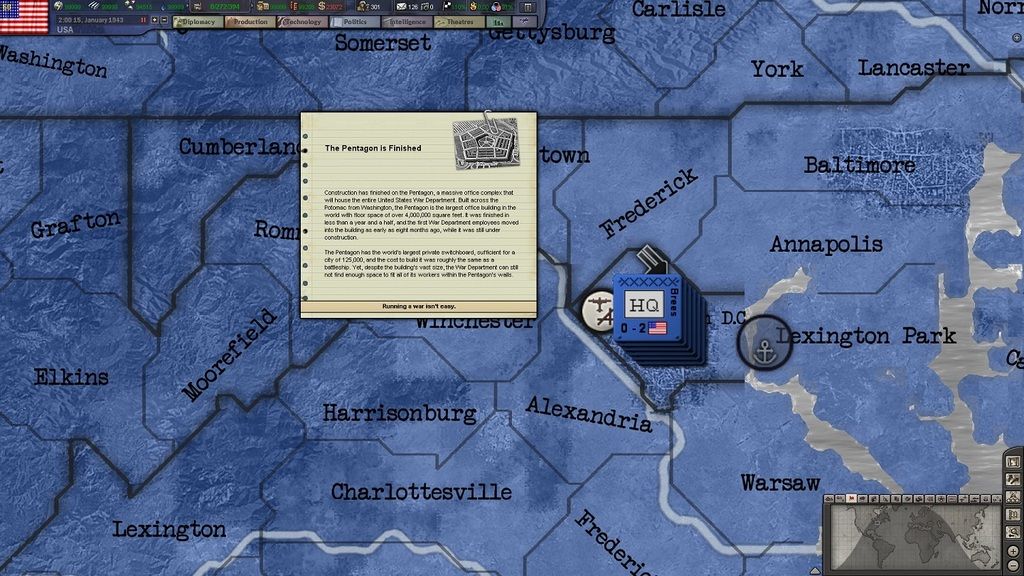
The Pentagon, a new HQ for the US armed forces
In the months that followed, the US army prepared itself for an invasion in Europe, while mopping up the remaining Axis forces in Asia. Japan was still active in French-Indo-China and Siam joined the faction earlier on. The general staff discussed the various options to invade Europe and eventually it came down to 3 options:
- Landings in north-west France, free the French and secure the ports of Brest and Lorient head east into Germany and north towards the Low Countries.
- Landings in north-west Germany, capture the ports in Bremen and Hamburg and move straight to Berlin.
- Landings in the Netherlands, secure the ports of Rotterdam and Amsterdam and move east and south.
The situation in Asia was pretty much the same. Japan retreated and the US advanced even further. By the end of January, French-Indo-China was for about 50% in the hands of the US and the remaining IJA was retreating to Siam. The dense jungle posed more a problem then Japanese soldiers did. In March, the US declared war on Siam after they declined the request not to shelter any Japanese soldiers. Outnumbered and still working with single shot rifles, the Thai had no chance against the well experienced, large and technologically advanced Americans. On April 22nd, they saw no other option than to surrender to the US.
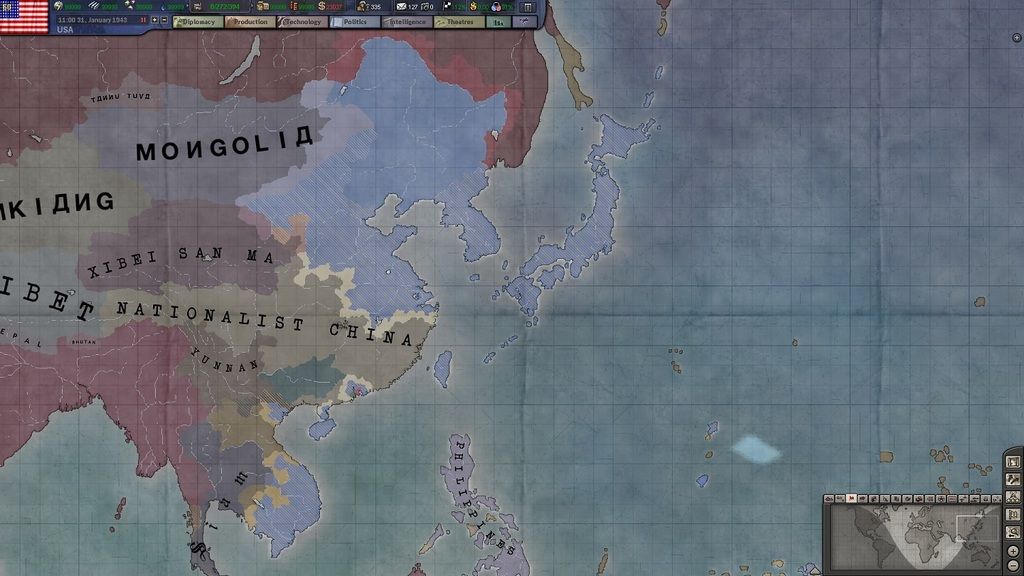
The campaign in Asia by the end of January, 1943
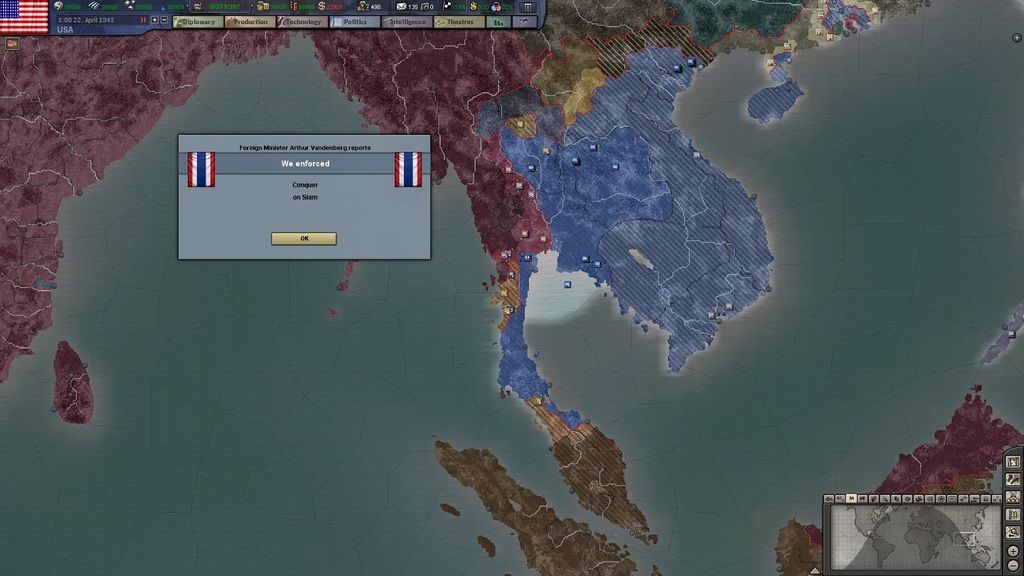
Siam surrenders
While preparing for the European campaign and shipping troops and equipment to Iceland, the Soviets were well on their way to Berlin. In May they reached the old Polish borders and the US was not even on mainland Europe. Time would tell if the US would succeed in capturing Berlin before the Soviets, but they would have to speed up their efforts to claim the victory.
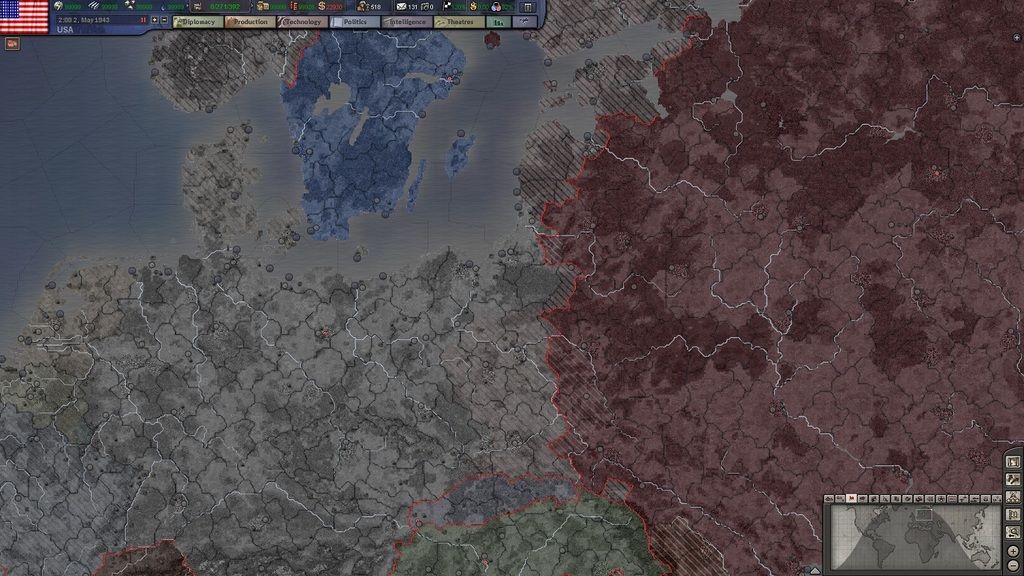
The Soviets advance more quickly then expected
- 1
If the Red Army managed to trap any significant numbers of Germans in those Baltic pockets they might indeed be on the roll now. But it wouldn't be the first time I see an Oder defence line hold far longer than expected.That is of course until hundreds of thousands of US forces slam into the European mainland.
It sounds like D-Day is right around the corner. I understand you wish to go for the western coastline, but if troop numbers permit it, might I suggest a secondary approach on top of it.
With a main thrust on the D-Day shores (wherever in Western Europe the blow falls) and the inevitable German relocation of forces, Southern Europe opens up. Considering your severe worries about communism speading, if you have the forces to spare I would launch a Churchillian-style invasion in the Balkans. It has the potential to liberate Greece and overrun Bulgaria and Albania. With sufficient forces you can even take down Romania and advance into Yugoslavia before the Red Army.
You'll need to judge wether it is possible since such move will obviously cause total collapse on the Axis eastern front. It will completely break things open both for you and Russia.
Perhaps something to consider...
It sounds like D-Day is right around the corner. I understand you wish to go for the western coastline, but if troop numbers permit it, might I suggest a secondary approach on top of it.
With a main thrust on the D-Day shores (wherever in Western Europe the blow falls) and the inevitable German relocation of forces, Southern Europe opens up. Considering your severe worries about communism speading, if you have the forces to spare I would launch a Churchillian-style invasion in the Balkans. It has the potential to liberate Greece and overrun Bulgaria and Albania. With sufficient forces you can even take down Romania and advance into Yugoslavia before the Red Army.
You'll need to judge wether it is possible since such move will obviously cause total collapse on the Axis eastern front. It will completely break things open both for you and Russia.
Perhaps something to consider...
If the Red Army managed to trap any significant numbers of Germans in those Baltic pockets they might indeed be on the roll now. But it wouldn't be the first time I see an Oder defence line hold far longer than expected.That is of course until hundreds of thousands of US forces slam into the European mainland.
It sounds like D-Day is right around the corner. I understand you wish to go for the western coastline, but if troop numbers permit it, might I suggest a secondary approach on top of it.
With a main thrust on the D-Day shores (wherever in Western Europe the blow falls) and the inevitable German relocation of forces, Southern Europe opens up. Considering your severe worries about communism speading, if you have the forces to spare I would launch a Churchillian-style invasion in the Balkans. It has the potential to liberate Greece and overrun Bulgaria and Albania. With sufficient forces you can even take down Romania and advance into Yugoslavia before the Red Army.
You'll need to judge wether it is possible since such move will obviously cause total collapse on the Axis eastern front. It will completely break things open both for you and Russia.
Perhaps something to consider...
Thanks for the suggestion and I'll think about it. I agree that opening up another front would mean the Axis will have to move their troops and jump to defense in the south of Europe as well, however, if that means that it helps the Russians in their thrust towards Germany, I could be screwed....
Yeah I would suggest you don't want the Russians capturing Berlin with you nowhere in sight...
It would seem you may wish to try to land on German shores - to try to take Berlin as fast as possible. A dangerous tactic at best but it would shorten the distance between your foothold in Europe and Berlin itself. Of curse, anything you do will help the Russians. And if your assault failed...you may want to think about France, Spain, and Western Europe instead of trying to go for Berlin.
May I ask, how much control you have over your forces? Do you let the AI do anything? I find the AI control over Theaters and Fronts to be interesting and, sometimes, amusing.
Also, if Japan is defeated, I assume it will become a puppet?
May I ask, how much control you have over your forces? Do you let the AI do anything? I find the AI control over Theaters and Fronts to be interesting and, sometimes, amusing.
Also, if Japan is defeated, I assume it will become a puppet?
Yeah I would suggest you don't want the Russians capturing Berlin with you nowhere in sight...
It is a struggle for sure, especially when you see how close they are already and my nearest troops are in Iceland. It will be a race and time is ticking away.
It would seem you may wish to try to land on German shores - to try to take Berlin as fast as possible. A dangerous tactic at best but it would shorten the distance between your foothold in Europe and Berlin itself. Of curse, anything you do will help the Russians. And if your assault failed...you may want to think about France, Spain, and Western Europe instead of trying to go for Berlin.
May I ask, how much control you have over your forces? Do you let the AI do anything? I find the AI control over Theaters and Fronts to be interesting and, sometimes, amusing.
Also, if Japan is defeated, I assume it will become a puppet?
The decision about where to land has been made and the Netherlands it will be. But you are right, anything I do will help the Russians, so speed is of the essence.
I have full control over my forces, in fact, the only thing that is on automate, is trade. Only once I've let the AI take control over my forces and I started crying after 10 minutes war started. My goldfish drowned after severe stress due to my rage and in the end I cuddled my hamster to death..... so no, I will not leave it to the AI again anytime soon.
I haven't decided whether I want Japan as puppet or as part of the US...... for now it is part of the US.
June 1943 – July 1943: Onward to Berlin – Phase I
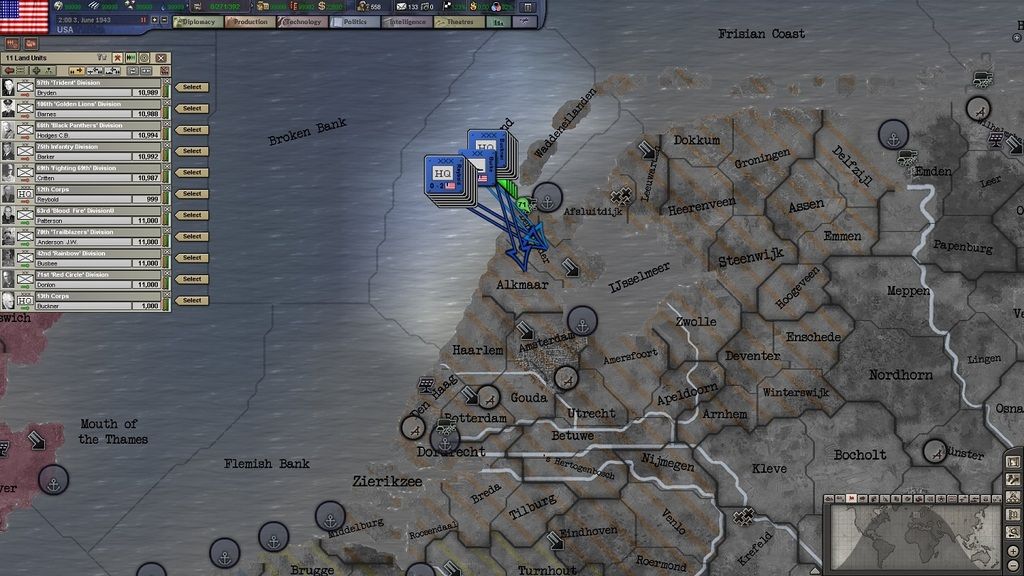
US 12th and 13th Corps initiate their landings
June 3rd, 1943, 2 am – 12th Corps and 13th Corps, lead by General Patton, initiate their landings on the beaches of Noord Holland, one of the coastal provinces in the Netherlands stretching from Den Helder area in the north to the Amsterdam and Haarlem area in the south. 13th Corps had no problem when getting off the ships and entering the beach between Bergen aan Zee and Egmond aan Zee. The two small villages west of Alkmaar were evacuated after Germany occupied the Netherlands to build a defensive line called the Atlantic Wall, which stretched from Norway along the North Sea coast all the way down to Spain. In the dunes along the Dutch coast, many bunkers were built by the Germans and on the beaches, mines were buried beneath the sand and steel poles were dug in and steel obstacles were placed partially in the water to prevent landings. Nonetheless the Netherlands and its flat terrain should provide ideal conditions to host the US landings. 12th Corps met resistance from the German forces stationed in Den Helder. The somewhat larger coastal fortifications gave the Germans some more protection against the assault. Being heavily outnumbered, the Germans had no other option than to leave the fortifications and seek refuge on the other side of the Afsluitdijk.
When the landings started, the local German commander ordered his communications officer the send the all-out alarm to Germany’s West HQ from the communications bunker in Alkmaar. West HQ responded swiftly and send a lot of infantry divisions to stop the American invasion.

Communications bunker in Alkmaar
After a day of fighting a beach head was secured by the US Army and the transports quickly moved back to Iceland to transport the men that were waiting there to be shipped to the Netherlands. Convoys with supplies were already waiting along the Scottish coast to ship their cargo to Den Helder. In the days that followed, German U-boats proved to be a major problem and a lot of convoy ships were. With this tactic Germany hoped to make the US soldiers run out of supplies and eventually force them to surrender. Nimitz responded by sending his fleets to the channel between the UK and France and along the Dutch coast. As the majority of the fleet was still operating in the Pacific, the supply lines were still fragile and it would take a couple of weeks before the area would be secured.
On the 9th of June, the Soviet Union liberated Poland from German suppression, but also installed a socialist government that collaborated with their new ‘allies’. The news shocked President Willkie a little bit as it showed how close the Soviet Union already was to Berlin. Willkie urged general Patton to hurry his advance or all efforts would mean nothing. Patton responded very calm that he was not worried at all and said to the President that the closer any nation would get to Berlin, the more fierce German resistance will be.
On the first of July, Nimitz reported that the last fleet took its position in the English Channel and that the supply lines would be secure from this day on. The last to arrive at the scene was 2nd USN Atlantic Fleet that helped in the Pacific, the new flag ship of the US Navy, was the recently build super heavy battleship USS George Washington. Though convoys never stopped, even though the risk of an attack was always present, there was a struggle in the advance and territory gain in June was very slow. Patton hoped to conquer the Netherlands before the end of June, but the sad truth was that not even half of the country was liberated.
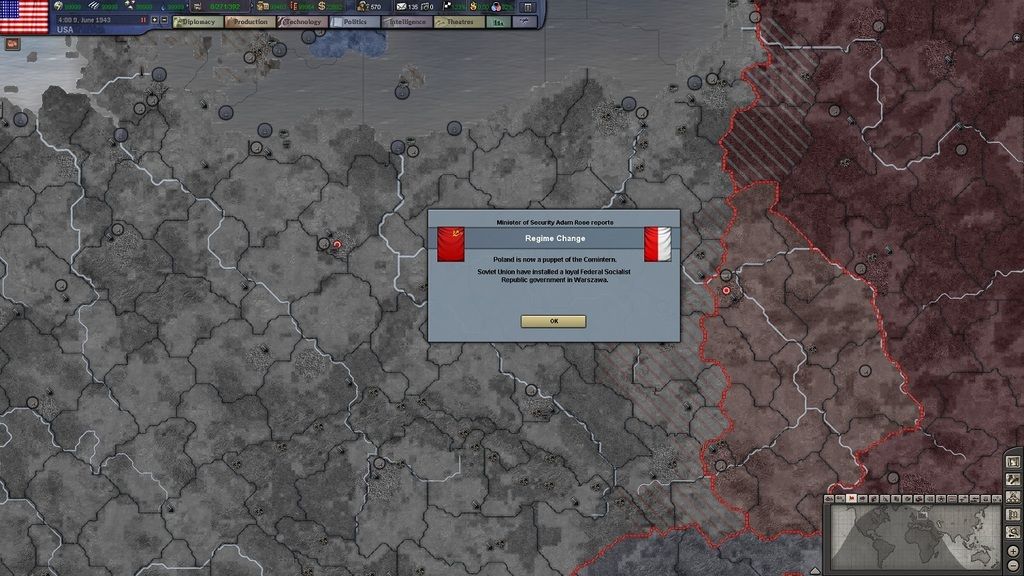
Poland is “free”
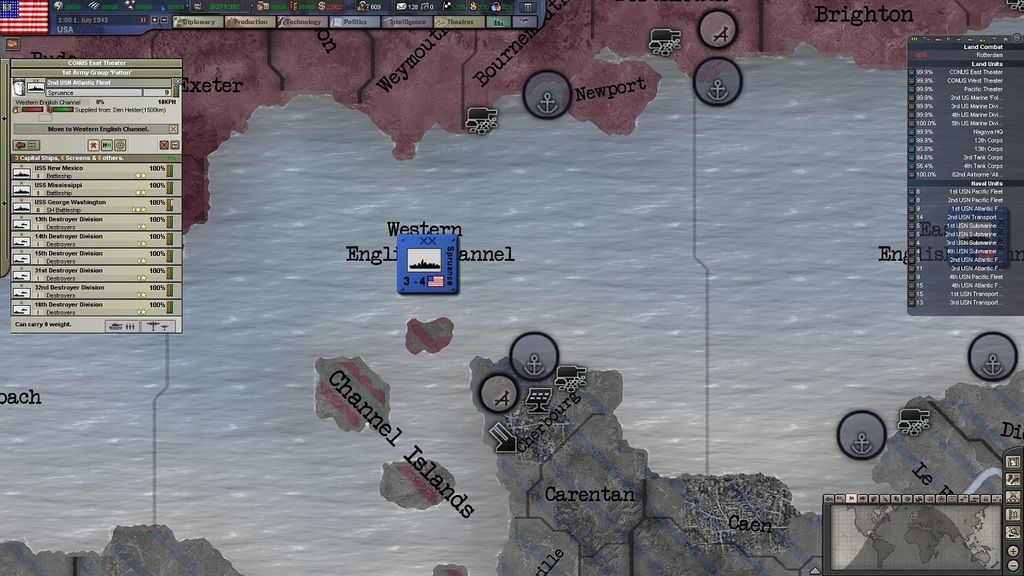
The English Channel is secure
The German forces rushed from Northern France, Belgium and even Denmark to prevent the US army to get a decent foothold in Europe. While Patton could not force a breakthrough, the Soviet Army was on a roll. In June and July even more nations were liberated or remained occupied by the Soviets. As the US was struggling to expand their actions in Europe, the Soviets used this to libera other nations before actually heading to Berlin. This way they had more allies or territory leaving less for the US. At the end of July, the Soviets liberated or occupied Poland, Hungary, Romania, Bulgaria, Yugoslavia and Greece. Patton had his work cut out for him….
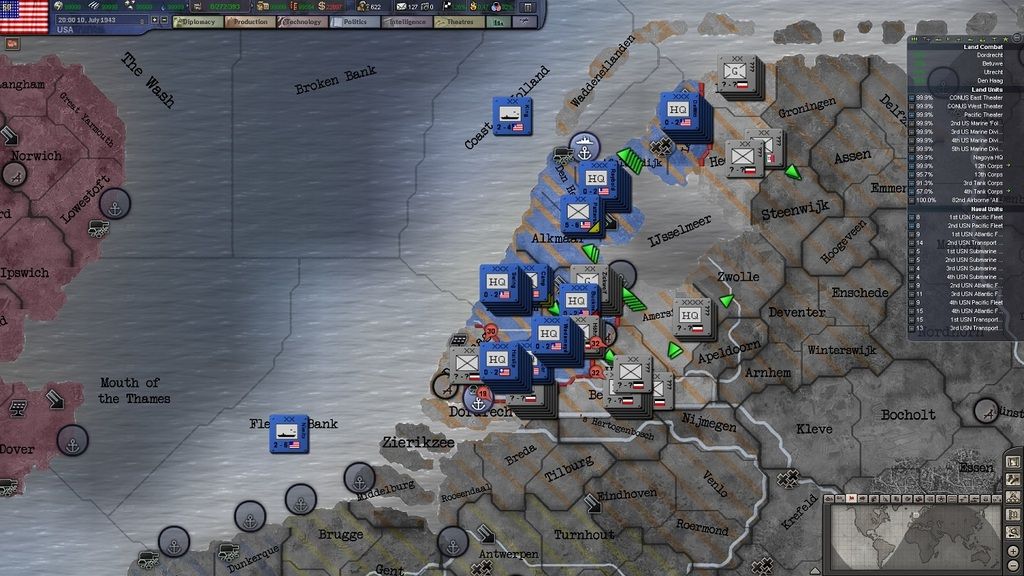
July 10th, 1943 – the US struggles in the Netherlands
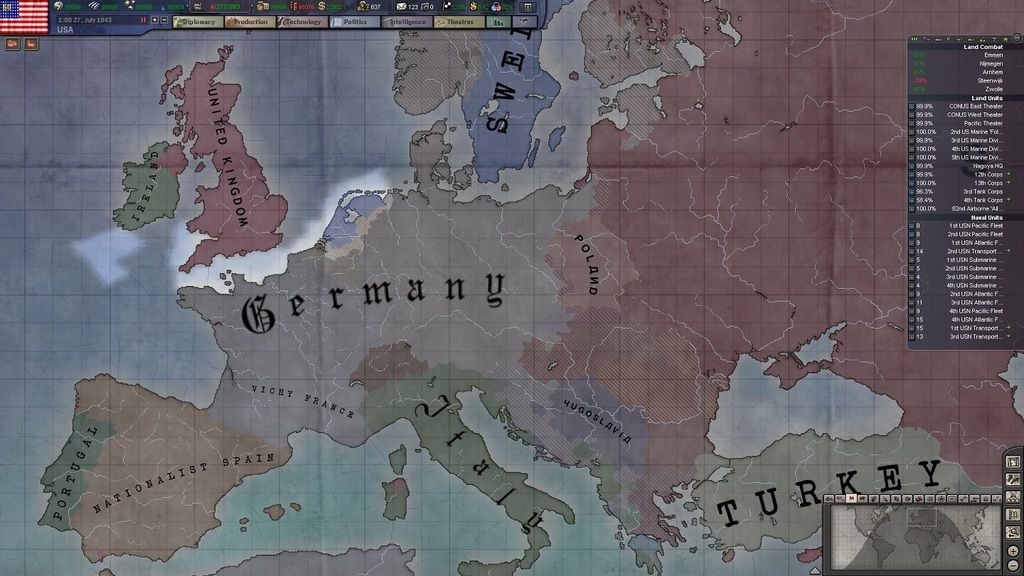
July 27th, 1943 – European theatre
- 2
Damn the Russians are moving fast. Much faster than I expected tbh. Unless the Red Army is halted at the Oder, I doubt you can get to Berlin before they do. And its too late for an attack on the Balkans. If you have the troops for it, I would open another front to secure Italy before the Russian army can occupy Venice and prevent you from liberating the country.
Forget Berlin. If you don't break out soon you'll be seeing much of Europe becoming annexed into the USSR and becoming Eurasia from 1984. Hehe. A second invasion would seem to be a sound suggestion - Germany has stripped a lot of the forces away to either face you or the Red Tide.

